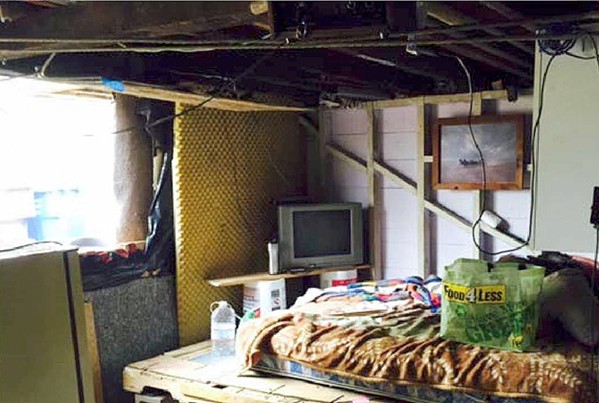For all of the beauty and romance of living in San Luis Obispo, being a renter in town can sometimes feel like an unpleasant struggle.
Whether it's getting hit with an increase to your already high rent, wondering if you'll just have to live with that leaky ceiling or broken heater, or not knowing why you never got your security deposit back, many SLO renters—including college students—encounter stressful housing challenges.

But remember: Tenants have rights, and California has some of the strongest tenant protections in the country. New Times reached out to Stephanie Barclay, legal director at the SLO Legal Assistance Foundation, to ask about the most common predicaments that student renters face and her advice on how to navigate them.
Barclay said that the SLO Legal Assistance Foundation gets "a lot of calls" from Cal Poly and Cuesta College students, and the most frequent complaints she hears are about rent increases and housing habitability. On both of those fronts, there are legal standards and rules that apply.
Health and safety
"Landlords are required to keep rental premises in a safe and 'habitable' condition," Barclay said. "This means things like doors and windows that properly close; plumbing, gas, and heating facilities maintained in good working order; hot and cold running water; safe electrical wiring; common areas and areas in control of landlord kept free from garbage and pests; and safely maintained floors, stairways, and railings. Landlords are also required to provide smoke detectors in all residential units."
As a tenant, if any of those items are missing or broken in a unit, you should put in a formal request with the landlord in writing. You should also document the condition of the unit beforehand with time-stamped photographs.
"The request should be dated, and the tenant should keep a copy for their records," Barclay said.

- Photo Courtesy Of The City Of SLO
- DILAPIDATED Local college students are often the victims of substandard housing. But tenants also have rights and legal recourses.
If the landlord has not responded or fixed the health and safety issue in 30 days (or fewer days if it's urgent), the tenant can take initiative to address the problem—like hire a plumber or go to the hardware store—and deduct that cost from their next rent check or, in serious cases, sue the landlord in small claims court.
"The 'repair and deduct' and rent withholding remedies are risky," Barclay noted, "and we do not recommend that a tenant do either of those without speaking with an attorney."
It's important to also understand the difference between unsafe and illegally substandard housing conditions and shabby but still-legal housing conditions, Barclay said. A landlord, for example, legally doesn't have to replace carpets, repaint a unit, or update home appliances—unless there is a health and safety hazard.
"Landlords are not required to keep the unit in an aesthetically pleasing state," she said. "Problems that are caused by the tenant (or their guests) are also not the landlord's responsibility to address. For example, if mold is caused by the tenant leaving damp belongings out ... the landlord wouldn't be responsible for addressing the mold. But if the mold is caused by some structural problem with the unit ... then the landlord would be responsible for addressing the mold in that case."
Raising rent
Landlords are allowed to raise rents, but those rent increases must fit within certain legal parameters, which depend on what kind of unit you live in. A 2019 state law set specific guardrails for rent increases in most apartment buildings, triplexes, duplexes that aren't owner-occupied, and mobile homes, Barclay said. The law does not apply to single-family houses.
"If a tenant is protected by [the 2019 law], the most their rent can go up over any 12-month period is 5 percent plus the change in cost of living over the past year, or 10 percent, whichever is less," she said. "As of Aug. 1, 2022, the most a protected tenant's rent can increase in SLO County is 10 percent above the previous rent. Rent can't be increased more than two times per year and the total increase can't go up over 10 percent.
"In any case, a landlord cannot raise the rent during the term of a fixed-term lease; that is, if you signed a one-year lease, ... the landlord cannot increase the rent during that year," Barclay said. "Also, landlords can never increase rent to retaliate against a tenant for exercising a legal right, such as asking for repairs or reporting the unit to code enforcement."
If your landlord is raising the rent, make sure to check the law—called the Tenant Protection Act of 2019—to verify that the increase is within the legal bounds. If it is, you're likely stuck with the higher rent, as the city of SLO does not have local rental control.
Security deposits
During the move-out process, tenants and landlords sometimes clash over the security deposit—the lump sum of money paid to the landlord before move-in to cover any damage caused by renters during their tenancy. As with unsafe housing conditions and rent increases, specific laws regulate how a security deposit can be handled by a landlord.
Landlords may deduct from a security deposit to cover costs to repair damage that's beyond reasonable wear and tear, to clean the unit only to make it as clean as it was when the tenant first moved in, and to recover any unpaid rent. A tenant is entitled to an itemized list of those deductions.
"A landlord may not make tenants pay for painting, new carpets, or curtains unless they are damaged beyond ordinary and reasonable wear and tear," Barclay said. "And the landlord cannot use the tenant's security deposit to repair problems that existed in the unit before the tenant moved in."
Barclay advised tenants to keep good records, including their email and text threads with their landlord. She also encouraged tenants to hold a professional tone and try to work in good faith with their landlord as much as possible.
"It is always best to try to work things out cooperatively and amicably. It is also good to have things in writing, in case a tenant needs to show, for example, that they notified their landlord about a problem with the unit that needed to be addressed," she said. "If a landlord refuses to address serious problems with the unit, an attorney may be able to help advocate for the tenant or educate a landlord about their legal responsibilities, but that should be the last resort." Δ
Assistant Editor Peter Johnson can be reached at [email protected].



Comments